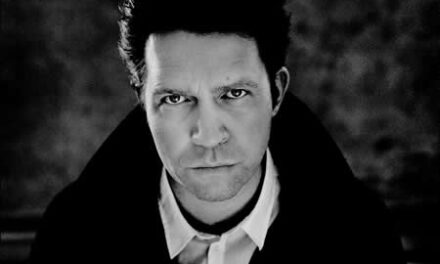As it has been demonstrating hereabouts since the 2009-10 season, the Harlem Quartet* is one of the chamber music world’s most exciting and innovative “newer” ensembles.
Likewise, pianist Misha Dichter** and his regular duo partner Cipa Dichter have become frequent visitors here.
On their own, the quartet or the pianist would be headline attractions. Put them together and the result, as seen and heard on a busy recent Sunday afternoon, proved to be one of the highlights of the year.
The occasion was a concert in Fletcher Opera Theater, presented on the Masters Series by the Raleigh Chamber Music Guild. The program encompassed music by Chick Corea and two of the most celebrated piano quintets in the repertoire – those by Robert Schumann and Antonín Dvořák. That means Dichter gave his Raleigh audience two for the price of one, a double treat for all concerned.
But before the concert itself began, there was a mini-recital of solo piano music by participants in the previous day’s master class with Dichter. The students – Julianna Versola (whose teacher is Olga Urick), Estelle He (Terry Thompson), Kenny Hoang (Margaret Evans), and Emily Xu (Florence Ko) – offered selections by Liszt (the Rigoletto paraphrase), Beethoven (from Op. 14/1), Mendelssohn (the Rondo Capriccioso), and Lowell Liebermann (the hauntingly beautiful Nocturne No. 4). Each young player had spent half an hour in mostly intense work with the visiting artist in Smedes Parlor late Saturday afternoon; the master’s touch was evident in many places as we revisited the music in the Fletcher lobby (where the performances were, fittingly, on Maxine Swalin‘s small Steinway grand).
(One should note that master classes are frequent components of RCMG concerts. These are open to the public, and there are few better ways for listeners to crawl inside the skins of composers and their music – or to experience world-class artists at work.)
***
The program began with Corea’s Adventures of Hippocrates, a set of five mostly short pieces united primarily by their charm, attractiveness, and flashes of deep emotion, any one of which could serve as a stand-alone offering (but this is in fact considered a regular string quartet). Although the score was prepared for the Orion String Quartet (whose readings may be sampled here), Harlem’s members – Ilmar Gavilán and Melissa White, violins, Jaime Amador, viola, and Matthew Zalkind, cello – have made this music their own, and their energetic, intense performance set high standards from the outset of this concert.
There followed Robert Schumann’s much-loved Piano Quintet in E-flat, Op. 44, one of the mainstays of chamber music. There are two primary ways to deliver it; Dichter and the Harlem opted for an intense, brisk, incisive reading that proved exhilarating throughout – have portions of it ever have been played at such speeds? Some traditionalists in the audience – artists whose opinions I value – lamented the loss of “romanticism” often associated with the piece, but for this listener, the “let-no-moss-grow-on-Schumann” approach seemed to reflect, say, Toscanini’s view of the composer, as opposed to (say) Furtwängler’s, if one may so characterize the interpretation of this basically symphonic piece by relying on 60-year-old accounts of those disparate orchestral masters….
This listener was flabbergasted that there wasn’t an instantaneous ovation as the last measures of the finale echoed in the hall.
After intermission, Dvořák’s magnificent Piano Quintet No. 2 in A, Op. 81 (B.155), was heard. There was more of the same intensity we’d heard in the Schumann, but this was for the most part a somewhat more relaxed rendition, in which the composer’s long, often radiant lines were generally savored by the artists and as a result by the audience. The two relatively recent additions to the roster – violist Amador and cellist Zalkind – made frequent and significant prominent contributions while violinists Gavilán and White were often angelic voices in the musical stratosphere. Overall, this was a performance about which to write home. Let’s hope it sparks a revival of the Czech master’s other chamber scores (aside, perhaps, from the ubiquitous “American” Quartet).
There was a rapid and enthusiastic response from the crowd when the Dvořák reached its conclusion, and it didn’t take much of it – the response – to elicit an encore. ‘Twas “Take the ‘A’ Train,” the Billy Strayhorn classic made famous by Duke Ellington. (As a young person, Strayhorn spent some time in Hillsborough, so we claim him as one of our own.) The quartet has played this here before, but this time there was an added bonus in the form of a complex piano part for Dichter that significantly enhanced the music’s impact. It’s a very good thing the visiting pianist wasn’t being paid by the note!
The Harlem stuck around the following day for two sessions at Ligon Middle School. These weren’t open to the public, but if they were anything like the ensemble’s last visit there, they must have been something to behold. Yep, there’s hope for art music, for sure!
*Previous appearances covered in CVNC include:
Greensboro’s 17 Days Festival Presents Harlem String Quartet by Kirby Hawkins, October 3, 2012
Harlem Quartet Spectrum: Somber to Joyful by Paul D. Williams, September 11, 2011
The Harlem Quartet by Karen E. Moorman, September 8, 2011
Harlem Quartet at Charlotte Chamber Music Festival by Meg Freeman Whalen, January 25, 2011
Harlem Quartet Provides Stylish Variety by Ken Hoover, March 21, 2010
An Embarrassment of Riches: Sphinx Chamber Orchestra with Elena Urioste and Harlem Quartet by Laura McDowell, September 24, 2009
**Recent visits by Misha Dichter include:
Brevard Philharmonic Features Misha Dichter in Season Opener by Laura McDowell, September 22, 2013
Dichter Shines at EMF Chamber Concert by Perry Tannenbaum, July 18, 2011
Dichter Woos Mozart; Orchestra Tackles Petrushka! by Peter Perret, July 15, 2011
***
Note: Hear the Harlem Quartet in two selections from the Corea suite, the Dvořák (with Dichter – mislabeled Op. 31), and the “‘A” Train” (without Dichter) here.












